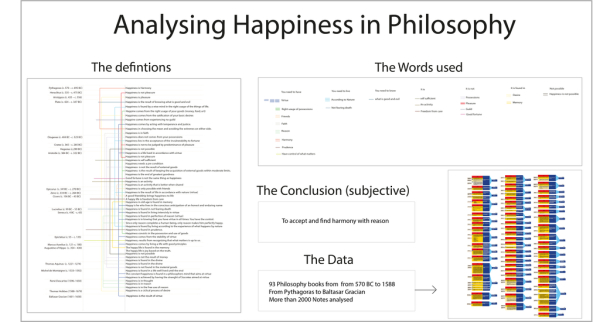I am often amazed at how little human nature has changed throughout recorded history.
Despite the exponential progress we’ve made in health, wealth, society, tools, and understanding ... we still struggle to find meaning, purpose, and happiness in our lives and our existence.
Last month, I shared an article on Global Happiness Levels in 2025. Here are a few bullets that summarize the findings:
- We underestimate others’ kindness, but it’s more common than we think.
- Community boosts happiness—eating and living with others matter.
- Despair is falling globally, except in isolated, low-trust places like the U.S.
- Hope remains—trust and happiness can rebound with connection and a sense of purpose.
Upon reflection, that post didn’t attempt to define happiness. This post will focus on how to do that.
While it seems like a simple concept, happiness is complex. We know many things that contribute to and detract from it; we know humans strive for it, but it is still surprisingly challenging to put a uniform definition on it.
A few years ago, a hobbyist philosopher analyzed 93 philosophy books, spanning from 570 BC to 1588, in an attempt to find a universal definition of Happiness. Here are those findings.

via Reddit.
It starts with a simple list of definitions from various philosophers. It does a meta-analysis to create some meaningful categories of definition. Then it presents the admittingly subjective conclusion that:
Happiness is to accept and find harmony with reason.
My son, Zach, pointed out that while “happiness” is a conscious choice, paradoxically, the “pursuit of happiness” often results in unhappiness. Why? Because happiness is a result of acceptance. However, when happiness is the goal, you often focus on what you’re lacking instead of what you already have. You start to live in the ‘Gap’ instead of the ‘Gain’.
So, it got me thinking – and that got me to play around with search and AI, a little, to broaden my data sources and perspectives. If you would like to view the raw data, here are the notes I compiled (along with the AI-generated version of what this article could have been, had it been left to AI, rather than me and Zach).
Across centuries, philosophers have wrestled with a deceptively simple question: What does it mean to live a good life?
As entrepreneurs, investors, and leaders, we often chase performance, innovation, or edge — but underneath it all, there’s a quieter inquiry: Am I living well?
Happiness aside, across 93 influential philosophical texts spanning two millennia, one word consistently reappears:
Eudaimonia. This is not happiness in the modern sense of pleasure, but a richer concept of
human flourishing — a life filled with purpose, virtue, and meaning.
-
Ancient thinkers saw happiness not as a mood, but as a life aligned with purpose and virtue.
-
Some prioritized inner character; others emphasized harmony with the divine or nature.
-
Debate endures over the role of external goods — wealth, luck, friends.
-
During the Renaissance, the conversation shifted toward subjective experience.
-
Across eras, the thread remains: Happiness is cultivated, not consumed.
Contradictions and Tensions
Thoughts on happiness contain paradoxes, contradictions, and tensions. Examining the boundaries between what you are certain of and what you are uncertain of is where insights occur. Here are a few to get you started.
-
Virtue vs. External Goods: Aristotle acknowledges external goods (wealth, friends) as necessary for complete happiness, while Stoics claim virtue alone suffices. This tension challenges the simplicity of virtue-based happiness, suggesting a nuanced balance between inner character and outer circumstances.
-
Subjective vs. Objective Happiness: Ancient philosophers often defined happiness as an objective state (living virtuously or intellectually flourishing), whereas modern definitions more often emphasize the subjective satisfaction varying by individual. This tension probes whether happiness is a universal or personal experience.
-
Happiness as Pleasure vs. Happiness as Duty/Struggle: Epicureanism equates happiness with pleasure (absence of pain), but Cynics and Stoics emphasize enduring hardship and discipline as the path to happiness, which presents a paradox between comfort and resilience.
Three Metaphors To Help You Think About Happiness
Metaphors help make abstract ideas more concrete, memorable, and easier to grasp. Here are three to consider.
The Ship Captain (Stoicism)
-
Metaphor: You can’t control the ocean (external events), but you can steer your ship (your mind).
-
Clarification: Highlights control over internal states despite external chaos.
The Team Soul (Plato’s Tripartite Soul)
-
Metaphor: The soul is a team where reason is the coach, spirit is the player, and appetite is the goalie. Happiness is achieved when the coach directs the players well.
-
Clarification: Demonstrates the importance of internal harmony and self-governance.
The Garden (Aristotle’s Life Cultivation)
-
Metaphor: Happiness is like tending a garden over time — it requires continuous effort, nurturing virtues (soil quality), and sometimes external help (sunlight, rain).
-
Clarification: This shows happiness as a process, not a momentary state.
Reach out – I’m curious to hear what you think!

Make Way For 2025's Biggest Unicorns
Billion-dollar startups are becoming increasingly common with VC funding surging, and an increased focus on exponential technologies.
VisualCapitalist put together an infographic based on May's PitchBook that highlights the newest Unicorns.
If you are curious, PitchBook defines Unicorns as venture-backed companies valued at $1 billion or more after a funding round, until they go public, get acquired, or drop below that valuation.
Here is the list for 2025.
Pitchbook via visualcapitalist
Topping the list (and eclipsing every other company on the list) is Yangtze Memory out of China. They're focused on flash memory and solid-state drives. Yup, that's still a thing.
Also high on the list is Abridge, an American AI startup focused on turning doctors' conversations with patients into documentation. If you've ever talked with a clinician of any sort, you know how time-consuming documentation currently is. The combination of AI and longevity—or age reversal—is likely to become an increasingly hot area for investment.
Meanwhile, a rising tide floats many boats ... and with the continuing rise of funding in AI, you'll also find a growing list of AI unicorns, like Peregrine, Synthesia, AnySphere, Mercor, and The Bot Company.
Although these individual companies are interesting, the larger trend is probably more significant.
There have been 43 new unicorns in 2025 alone. And while the most profitable unicorns from 2024 are still OpenAI, ByteDance, and SpaceX, their competition is on the rise.
I've been a tech entrepreneur for decades, so I'm used to the constant march of progress. But this feels different. The pace is quickening!
We certainly live in interesting times!
Posted at 11:02 PM in Business, Current Affairs, Gadgets, Ideas, Market Commentary, Science, Trading, Web/Tech | Permalink | Comments (0)
Reblog (0)